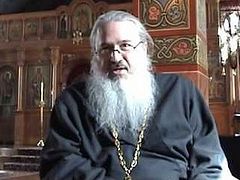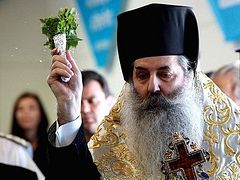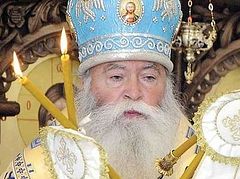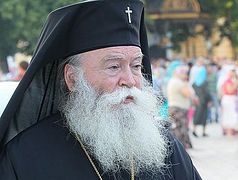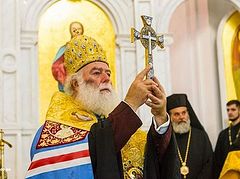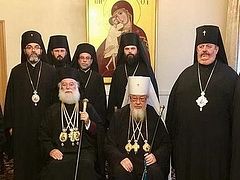“Day and night I was on guard at our representation church in Odessa, so the schismatics couldn’t break down the door and get into the church,” His Beatitude says.
Warsaw, October 30, 2018
The Orthodox channel Soyuz (Union) filmed an episode of its program “Archpastor” with His Beatitude Patriarch Theodoros II of Alexandria and All Africa during his fraternal visit to the Church of Poland last month. The video was then aired and posted online on October 10, just one day before the Holy Synod of the Ecumenical Patriarchate announced that it had received Ukraine’s schismatic bodies into communion with itself, having lifted the anathemas against their leaders and having restored them to their former clerical ranks.
In the interview, His Beatitude spoke of the festive celebrations he attended in Poland, of the hard life led by his flock in Africa, and of the continuing ecclesiastical troubles in Ukraine.
Asked, “Your Beatitude, … I know that you care about Ukraine, at least because you studied, lived, and served in Odessa for many years. How do you view the tragedy of Ukrainian Orthodoxy?” Pat. Theodoros recalled the trying times that he experienced in his time in Ukraine, largely due to the activities of schismatics:
I often say that the theme of Ukraine is especially close to me because I lived there for ten whole years. I experienced hunger and various other difficulties with them that fell to the lot of Ukrainians during perestroika. I went through the difficult time of schism when these huge processes began—the movement towards autocephaly, to create their own schismatic Church. I experienced these difficulties then in Odessa when they wanted to seize our Orthodox churches. Day and night I was on guard at our representation church in Odessa, so the schismatics couldn’t break down the door and get into the church of the Patriarchate of Alexandria. Therefore, I’m well acquainted with the problem that has arisen in Ukraine today.
We ask to take all possible measures to resolve this problem in the Church, which, in my opinion, is not so much ecclesial as it is political. History shows that every time when political authorities start butting into Church affairs, problems arise.
The interviewer’s next question is especially interesting and timely, considering what Constantinople was to announce just a few weeks later:
“Your Beatitude, what is the danger in legalizing the schismatic groups headed by the so-called Metropolitan Philaret (Denisenko), and the second structure—the so-called Ukrainian Autocephalous Orthodox Church? Suppose they are recognized by Patriarch Bartholomew, what’s next?”
To this important question, His Beatitude responded by focusing on the Church’s other-worldly task, as opposed to the political moves of Denisenko and the other schismatics:
Philaret has been creating this schism for a long time because he absolutely could not reconcile with the fact that he didn’t become the Patriarch of Moscow. In the early 1990s, the Russian Orthodox Church chose the most-wise Patriarch Alexei II. Philaret’s personal ambitions are intertwined with politics.
As His Beatitude Onuphry has said, the Church should be apart from politics. We must not hide, but we have to see that there is a political interest lying behind all of this. Every time when the Church got involved in politics, it had many problems. Politicians never care about the good of the Church, but always sought only personal gain, because the Church is repentance, patience, love, and condescension.
Several primates and hierarchs have pointed to the political nature of the Ukrainian autocephaly movement, calling on the Ukrainian government to remain within its sphere, including Hs Beatitude Metropolitan Rostislav of the Czech Lands and Slovakia, His Beatitude Patriarch Theophilos III of Jerusalem, and His Eminence Metropolitan Seraphim of Piraeus.
As for the matter of recognizing Philaret, the Ecumenical Patriarchate had previously confessed the Russian Orthodox Church’s exclusive competence to defrock and anathematize Philaret, thereby rejecting the appeal he had received from Philaret in the summer of 1992. It remains unclear how competence was transferred from the Russian Church to that of Constantinople.
His Beatitude Pat. Theodoros also recalled the appeal that he had only just recently signed with the primate of the Polish Orthodox Church His Beatitude Metropolitan Sawa of Warsaw and All Poland, in which they called for everyone to approach the Ukraine problem with prayer and with an eye to preserve peace.
He continued:
As Patriarch of Alexandria, I am particularly following the events in Ukraine with special emotion. There are 54 African countries in my jurisdiction; I have seen hunger, misery, poverty. I pray and do everything in my power for our Church to abide in peace. The holy Patriarch of Alexandria Peter saw Christ in a torn robe, therefore I, humble Theodoros, must serve to ensure that Christ’s robe is not torn this time.
Following his time in Poland, the Alexandrian Patriarch then traveled to Ukraine to express his love and solidarity with the canonical Ukrainian Orthodox Church, promising to inform the primates of the world’s Orthodox Churches of his first-hand knowledge of what is really happening in Ukraine.
Follow us on Facebook!


